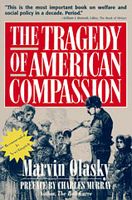The Tragedy of American Compassion

I saw a reference to this book while reading Bush's Brain and, like usual, put in a request at the library.
The Tragedy of American Compassion by Marvin Olasky examines the change in attitude towards what is sometimes called charity, compassion, welfare or other things. Basically it's how society looks at poor and/or homeless people and what obligation the better off do, or do not, have towards them.
There was a lot of activity in the charitable arena at the turn of the last century, and this book notes many of the methods of various New York organizations as well as others around the nation. Much debate centered around whether charitable assistance was a right that the “economically depressed” deserved or something that could cause perfectly capable people to become careless and “pauperized”.
Many of the late 19th century groups determined whether potential beneficiaries of their help were truly needy by using “work tests”. By performing some service (often helpful to others in need) applicants for aid could show that they were committed to doing something about their situation themselves and weren't just looking for a handout.
Probably the greatest loss you see when contrasting now and then is the lack of personal involvement. In small communities folks new each other and their situations well and thus could help in a way that was beneficial. In more urban society such kindness often becomes impersonal and the balances in place when personal knowledge is in the picture easily disappear. There is more potential for abuse by both the giver and the receiver.
Somewhere (Mr. Olasky points to the sixties-seventies) government financial assistance became a right instead of a last resort. The transfer of the responsibility from citizens to the government, of supporting those in need, had been in process for a long time. However, it was now seen as something owed rather than given or lent.
Charitable organizations also used to be free to emphasize the change of the inner person as a necessary part of the change from reliance on alms to self-sufficiency. Now, if they receive government support, such establishments must not “discriminate” in any way or promote faith in God and renewal of spiritual life through Jesus Christ as an important part of gaining independence. Since assistance is now a “right” it seems to be the “correct” thing to give it out indiscriminately. Be tolerant! But I won't start on tolerance...
This is definitely an interesting work. I would say the best chapters are the first few and the last few. Several chapters in between are full of examples from the turn of last century that, while informative, become redundant.
Read more at: The Tragedy of American Compassion


0 Comments:
Post a Comment
<< Home